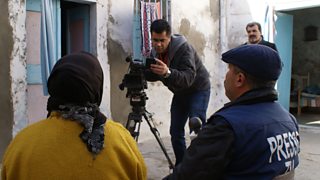Iheb Chaouch is the presenter and a producer of political discussion programme Siessa Show on T茅l茅vision Tunisienne. Iheb has been one of the broadcaster鈥檚 many staff taking part in a two-year 主播大秀 Media Action project supporting T茅l茅vision Tunisienne in its transition to public service broadcasting.

主播大秀 Media Action's staff training T茅l茅vision Tunisienne journalists.
In the days after the ousting of President Ben Ali in 2011, journalists in Tunisia were both hopeful and fearful about the prospect of new freedoms of expression. As the pressure group Reporters Without Borders asked at the time, "We are free but for how long?"
Now, over two years after the Tunisian uprising, the hope and fear remain.
On one hand, Tunisian media is now relatively free from restrictions. But on the other hand, the media sector is marked by disorder – with dozens of television channels, radio stations and newspapers now established whose sources of funding are unknown – and threats to freedom of expression.
Reforms remain unimplemented
A few days before the October 2011 elections, two legislative decrees on media freedom were passed after strong civil society pressure. Decree 115 forbids restrictions on the flow of information and protects journalists’ sources while decree 116 provides for the creation of an independent regulatory authority.
But the ruling party Ennahda have failed to implement both decrees. And recently a group of deputies from CPR, President Moncef Marzouki's party, made a second attempt to submit a legislative project containing 13 articles restricting the freedoms protected by decree 115. One of these articles, for example, would heavily restrict the right to criticise the government and increase the risk of journalists facing imprisonment.
What's more, a number of journalists have also spoken out publicly about hidden, 'soft' censorship. In April, for example, journalists at the very popular radio station Shems FM complained that an article about Tunisian President Moncef Marzouki’s trips to Germany and Doha had been removed by the station's Director General.
New coalition
The reaction to such attempts at censorship has been swift and loud. The former chair of the National Commission toReform Information and Communication, Kamel Laabidi, sounded the alarm, declaring that the proposed new legislation would result in a more restrictive press code than that in the time of Ben Ali.
And only a week ago, a new coalition was formed, including the National Union of Tunisian Journalists (SNJT) and the Tunisian League for Human Rights, to safeguard freedom of expression in Tunisia. They complained about "the gravity of the repeated attempts to obstruct the reform of media in meeting professional, ethical and international standards."
The coalition have also called for a stop to the current policy that sees the government directly appoint the heads of public media institutions – a practice that decree 116, if implemented, would bring to a close.
There's no doubt that two years after the Arab Spring, the hopes of journalists in Tunisia remain frustratingly unrealised.
But we're also even more aware today of how crucial our role in not allowing the country to slip back into any form of dictatorship. With continued support from the international community, we will continue to fight to remain free.
Related links
